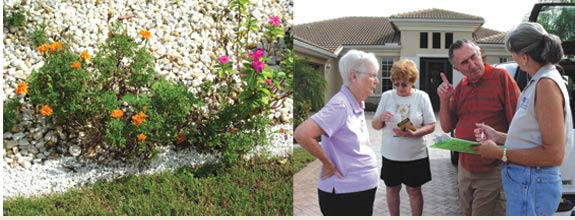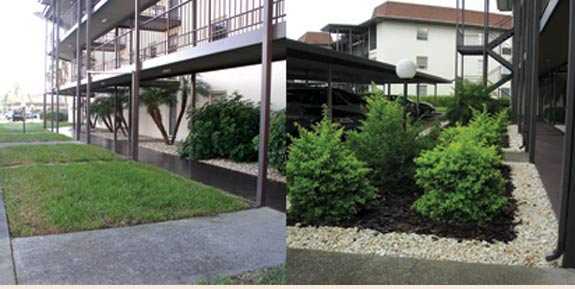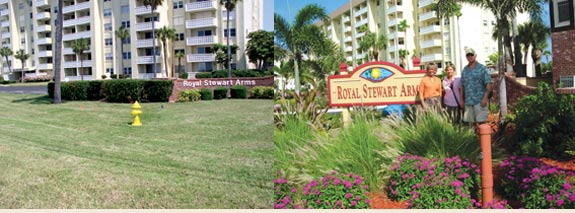More and more community associations are asking the District and the county Extension agents with the Florida Yards & Neighborhoods program for help with their landscape and irrigation concerns.
Some of the common problems Extension agents see include excessive watering and fertilizing as well as overpruning and improperly maintained irrigation systems.
By taking a proactive approach to learn about efficient irrigating techniques and Florida-friendly landscaping, these communities are leading the way in conserving water and protecting the environment.
Here’s how three associations within the District worked with their county Extension offices to tackle their problems.
Fountain Blue, Sun City Center
The Fountain Bleu homeowners association is a four-year-old community located in the Renaissance development of Sun City Center. It is a small association with about 20 homeowners.
The main complaint these homeowners have is keeping their turf from turning brown and dying.
“That’s one of the main reasons associations call me,” said Lisa Strange, Florida Yards & Neighborhoods community association coordinator. “Most people want to know how to prevent their turf from getting brown spots and they want to learn about more efficient methods of irrigation.”
 Left: This plant is stressed because it is surrounded by white rock instead of mulch. Right: Lisa Strange, Florida Yards & Neighborhoods community association coordinator, talks to Bill O’Dell, a homeowners association president.
Left: This plant is stressed because it is surrounded by white rock instead of mulch. Right: Lisa Strange, Florida Yards & Neighborhoods community association coordinator, talks to Bill O’Dell, a homeowners association president.
Most neighborhoods in Sun City Center, including Fountain Bleu, have Bermuda grass, which is a type of grass used on golf course putting greens.
Strange says the master developer required Bermuda grass in its Sun City Center neighborhoods because it is easier for their maintenance crews to use the same equipment to mow both the golf courses and the lawns.
Bill O’Dell, the association president, asked Strange to speak at an association meeting.
“We wanted to learn what’s out there and what we can do to improve our landscape while conserving water so we can be the example for other communities to follow,” said O’Dell.
Strange talked to the group about Florida-friendly landscaping practices and conducted a comprehensive site visit to evaluate their landscaping.
After inspecting one home’s irrigation system and performing a catch-can test, she found that inefficient irrigation helped cause the brown spots. Some sprinkler heads were broken or misdirected.
Strange also said their lawns were cut too short. The recommended height for Bermuda grass is ½ to 1½ inches tall.
No matter what kind of grass you have, maintaining an efficient irrigation system and mowing the lawn to the proper height are two key practices to improving turf health. Other options for this association include installing turf that requires less water and increasing the size of the planting beds, which use less water than turf and can be very attractive.
Strange also pointed out several other poor landscaping practices concerning mulch, improper plant placement and overpruning shrubs and trees.
She recommended the residents stop using white rock in the plant beds because it attracts heat during the day and holds onto it through the night, “cooking” the plant roots. Organic mulch helps retain moisture, moderates soil temperature, provides organic matter and reduces erosion and weeds.
Strange says the planting beds would also benefit from planting the right plant in the right place. For instance, she saw sun-loving plants in shady locations and vice versa.
Overpruning causes plants stress and opens them up to diseases and pests, ruins the trees’ natural form and produces large amounts of growth that are poorly attached, making them more prone to loss from wind.
Strange continues to assist the Fountain Bleu homeowners association in their efforts to improve the quality of their turf and plant beds.
Gulf Harbors Condimoniums, Inc.
The Gulf Harbors condominium complex, located in New Port Richey, includes 42 buildings and 537 condos. All landscaped areas are maintained by the condo association’s staff.
About a year ago, Susan Bedford, property manager, contacted Doris Heitzmann for a landscape evaluation and advice on how to deal with the declining turf areas located between the carports and the buildings. Heitzmann is a horticulturist and community outreach coordinator with the Pinellas County and Pasco County Extension offices.
 Problem turf areas between the carports and the buildings, like the one shown above left, were transformed into beautiful, low-maintenance areas using the Florida-friendly landscaping principles.
Problem turf areas between the carports and the buildings, like the one shown above left, were transformed into beautiful, low-maintenance areas using the Florida-friendly landscaping principles.
The 17 areas with declining turf were not watered by an irrigation system and used to be covered with a variation of St. Augustine grass. Some of the areas were dry, others were wet, and many of the areas were partially shaded.
“We looked into installing an irrigation system but it was too expensive and it wouldn’t solve our problems in the wet areas,” said Bedford.
Heitzmann suggested installing Florida-friendly landscaping in these trouble spots. After presenting her plan to the condo board, they approved it and gave Bedford a budget to fix the problem areas.
Bedford and the grounds staff have installed Florida-friendly landscaping in 11 of the areas and are working to finish the rest of the trouble spots.
“The residents have been very supportive of the change,” said Bedford. “They like seeing the pretty plants instead of the thin turf we used to have there.”
In most of the areas, the entire plant bed is mulched. However, in the areas near gutter downspouts, they use rock because the mulch would float away.
“If it gets a little dry, our grounds crew or the residents will hand-water the plants,” said Bedford.
In addition to fixing these trouble spots, Heitzmann and the condo staff also found other areas where they could apply the Florida-friendly principles and conserve water.
“We’ve always monitored our irrigation system for the large turf areas,” said Bedford. “We shut it off and only water when the turf needs it, not just because it is our watering day.”
Heitzmann recommends that homeowners and condo associations that do not have on-site staff have a designated member of the board or the landscape committee work with their landscaping company to make sure the community is maintained to the association’s satisfaction and timetable.
Royal Stewart Arms, Inc.
Irrigation costs were busting the budget of the Royal Stewart Arms condominium complex, located on Honeymoon Island in Dunedin.
“We were spending almost $40,000 a year,” said Sharon Wilson, property manager for the complex that includes eight residential buildings with 449 condos. “Because we border a sensitive area and reclaimed water is not available to us, we knew we had to look at other solutions.”
 Royal Stewart Arms residents transformed the front of their complex using Florida-friendly landscaping principles. Now they use less water and have a beautiful entrance.
Royal Stewart Arms residents transformed the front of their complex using Florida-friendly landscaping principles. Now they use less water and have a beautiful entrance.
Linda Hildenbrand, one of the landscape committee members, contacted Heitzmann, who met with the landscape committee and property manager before attending a board meeting. She suggested the association make over the entrance and some of the common areas by transforming them into Florida-friendly landscapes. She also suggested they install micro-irrigation in the areas and apply for grants to help pay for the project.
The association secured a grant for $8,887 from the city to expand the planting areas in the front of the complex. Al Blalock, landscape committee chair, took the lead on the project by teaching volunteers and the maintenance workers how to retrofit the irrigation system with micro-irrigation.
Blalock and about 20 residents did a variety of tasks, including shrub removal and other ground preparation as well as installing the micro-irrigation system and the new Florida-friendly plants. They also installed rain shutoff devices.
Blalock manually turned the micro-irrigation system on during the plants’ establishment period. He continues to monitor the plants in all the common areas, turning on the water only when it is needed.
Blalock also learned they could do the same with the grass, skipping a week of irrigation when the lawn did not need it.
“Doris told us that turf goes dormant in the winter months and does not need as much water to survive,” said Blalock. “We were worried when it got a little brown, but it grew back and looks as good as ever.”
Heitzmann taught the community how to look for the first signs of drought and to irrigate only when turf and plants indicate stress.
Before learning about the “skip-a-week” concept and installing micro-irrigation in Florida-friendly landscaped areas, Royal Stewart Arms used 3,640,000 gallons of potable water for irrigation between Oct. 2006 and June 2007. This cost $17,597.
After learning about the benefits of skipping a week of irrigation, they decided to take it one step further.
“We do more than skip a week, we skip months,” said Hildenbrand.
During Oct. 2007 and June 2008, the community did not irrigate the common areas. The association only used 693,000 gallons of water for irrigation, which cost $3,676. That’s a savings of 2,947,000 gallons of water and $13,921 over the same period as the previous year!
“The documented water and cost savings are impressive,” said Sallie Parks, District Governing Board member and co-chair ex officio of the Pinellas-Anclote River Basin Board.
Parks learned about the condo association’s efforts through her work at the District and attended a Dunedin city commission meeting in support and recognition of their efforts at Royal Stewart Arms.
“It takes a champion to lead,” said Parks. “This condo association is an example to the city and the entire community.”
If you would like to learn more about Florida-friendly landscaping, visit the District’s web site at WaterMatters.org/residents/. There is also a link on the page that leads to the contact information for the county Extension offices and Florida Yards & Neighborhoods coordinators.
